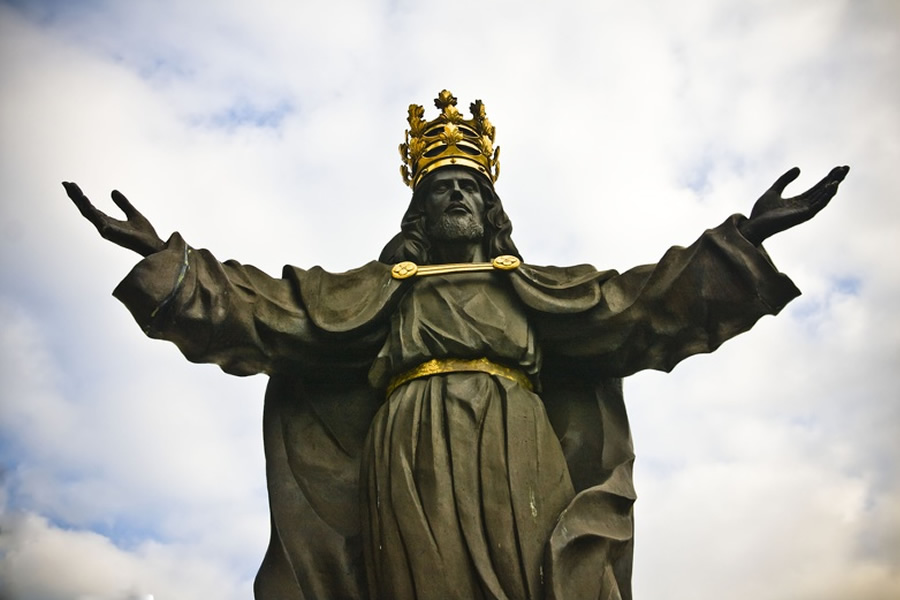Blog & Pastor Letters

Jesus and the Quest for Leadership in a Fragmented World
by Rev. Victor C. Yakubu | 11/24/2019 | Weekly ReflectionThe virtue of human life is to be content with what you have. What makes life meaningful is the ability to acknowledge the blessings we receive from family and friends. If you grumble every day because of what you don't have, you may not appreciate what you have. On the other hand, if everyone got what they ever wanted, they may grow up to be arrogant. It however does not diminish the desire to seek what you want by keeping a positive attitude that those things can materialize tomorrow. Hope therefore, is a virtue that urges you to keep a positive posture that your dreams will come true someday.
From all indications, a review of the world's woes can directly be attributable to individuals who feel dissatisfied by certain standards in the world. Instead of accepting opposing views, they indulge in violent means towards a resolution as compared to a dialogue. The number of dissenting voices or groups is growing day by day and the effect of their collective dissatisfaction has rendered many innocent souls destabilized. This makes leadership uniquely important in guiding nations, peoples, individuals, or groups towards convening at the dialogue table to resolve those glaring differences. Most often the leadership gaps we identify can either increase the tensions between dissenting groups or lessen our focus for solutions.
Continue
The End of the World
by Rev. Victor C. Yakubu | 11/17/2019 | Weekly ReflectionThroughout the history of the world, humans have obsessed themselves with how the world will end. It is natural to ask whether the world we live in will end at some point in time. But let us pause a moment to ask equally whether humans truly understand the origins of human life? Indeed, scientists have developed many theories on the origins of human life. Credit must be given to them for the research theories such as the theory of evolution or the big band theory. All these theories and many unpopular ones only reflect our desire to understand where we came from and what will happen to us. In a way, this gives credit to the human desire to ask about how the end will be.
Answers to the question of the end of the world are based on human observation on factors such as wars, weather, migration, economic imbalances, or other natural forces. As long as the world exists, humans will keep speculating on how the world will end.
Your title here...
Continue
Marriage, Remarriage, and the Resurrection
by Rev. Victor C. Yakubu | 11/10/2019 | Weekly ReflectionIn March 2016, Pope Francis released a document entitled Amoris Laetitia about the family. In it, the pontiff discusses marriage and his position on divorced Catholics who remarry civilly. For a long time, the Church has always taught that those who separate after a Catholic sacramental marriage and remarry in the civil way, cannot receive Holy Communion. In Chapter eight, the pope indicated that this could change through "discernment regarding the possible access to the sacraments of some of those who are divorced and in a new union." He chose his words carefully for the understanding in the Catholic world and beyond. A whole series of dialogue continues whether remarried couples in the civil way can receive Holy Communion.
Prior to this exhortation by Pope Francis, there were two Synods of Bishops on the Family in October 2014 and in 2015 in Rome. The pope seems to indicate that his position in Amoris Laetitia is based on the fruits of these two synods. Many dioceses all over the Catholic world have been studying the exhortation carefully in order not to water down the centuries-old teaching of the Church. Remarried couples like any other Catholics, need salvation through the reception of the sacraments of the Church. But this does not mean that the teachings of the Church should be reduced to accommodate couples who do not remarry in the Church but choose to do so in the civil way. By not recognizing the importance of the sacrament of marriage, they alienate themselves from Holy Communion.
Continue
Salvation For All People
by Rev. Victor C. Yakubu | 11/03/2019 | Weekly ReflectionThe story of Zacchaeus is a popular biblical discourse that bible students never easily forget because "he was short in stature." The story of Zacchaeus is always interesting to read. I often ask myself why Zacchaeus had to give half his possessions to the poor or promise to repay four times all those he had extorted. I often ask myself why a man of great wealth could dispose of it for no just reason. Was he excited by meeting Jesus? Finding answers to these questions to know the state of mind of Zacchaeus may be difficult. But reflecting on the story reveals that he desired a better life. The gospel tells us that he was from Jericho, and he was the chief tax collector of that town. By knowing his profession, we can say that he was familiar with cash flows. I can imagine how much money he extorted from the citizens on behalf of the Romans.
From reading biblical commentaries, I know that tax collectors increased percentages on amounts they collected in order to cover their administrative costs. As the chief tax collector, I imagine that Zacchaeus had a staff that was large and aggressive in collecting taxes. This job gave him fame and made him infamous for two reasons. While the Roman authorities pressured Zacchaeus to collect taxes for the numerous projects of the empire, he, in turn, pressured the citizens to pay or be locked up. Some unlucky citizens were even sold to cover their taxes. The Romans considered tax evasion a criminal offense. So, imagine Zacchaeus in the middle of these two sides: always receiving and always giving.
Continue